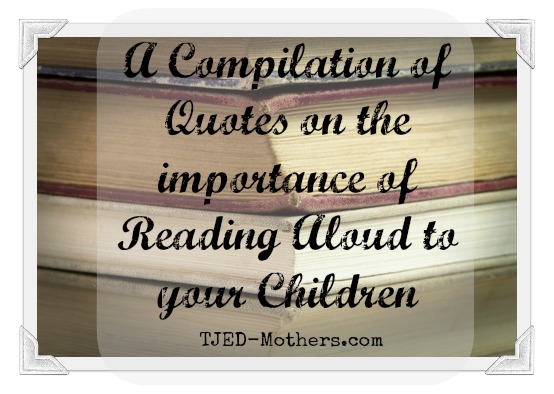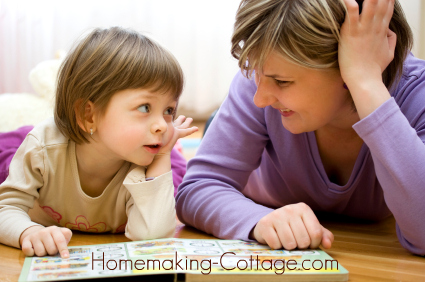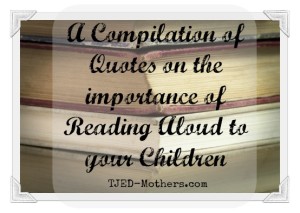You have no items in your cart.
The Importance of Reading Aloud to your Family

Reading aloud to the family seems to be a dying art. I grew up with my parents reading a variety of church or classic books to us and it meant so much to each of us. In home educating my family I’ve gained a strong testimony in the learning and bonding power of reading aloud to my family. I’ve often share with friends and loved ones the importance of reading aloud and also the importance of choosing good literature such as classics that will teach and illustrate valuable life lessons.
Did you know, for those who are LDS, that it is a commandment for us as parents to read aloud to our families? That shows the importance of reading and how it can bless and teaches.
Here are some tips for reading aloud to your families.
- For little children, give them quiet things to play with or do while you read.
- Do it consistently, but I find during the busy times we don’t get it done every night. Do it as often as you can.
- Set aside time every day specifically for quiet reading time.
Don’t read books that you are finding boring. There are so many great books to read aloud and your feelings come through as you read it aloud. It’s okay to stop a book that isn’t working for a read aloud.
Now on to the quotes:
“Good reading begins at the bedside of your little ones,” Elder Marvin J. Ashton of the Quorum of the Twelve counsels parents. “Never be too busy to read wholesome bedtime stories at the close of the day. Select from the classics of children’s literature uplifting stories that can build noble ideals in your youngsters. … Consider the difference in children who are cuddled and snuggled by parents at bedtime as they listen to stories from good books, and then kneel at their bedside in prayer, as compared to those who go to bed after having viewed a violent television program.”
(General Conference, October 1977.)
There are, however, identifying features which are to be found in a happy home, whatever the number or description of its family members. I refer to these as “Hallmarks of a Happy Home.” They consist of:
- A pattern of prayer.
- A library of learning.
- A legacy of love.
- A treasury of testimony.
A second hallmark of a happy home is discovered when home is a library of learning. An essential part of our learning library will be good books.
Books are keys to wisdom’s treasure;
Books are gates to lands of pleasure;
Books are paths that upward lead;
Books are friends. Come, let us read.
Reading is one of the true pleasures of life. In our age of mass culture, when so much that we encounter is abridged, adapted, adulterated, shredded, and boiled down, it is mind-easing and mind-inspiring to sit down privately with a congenial book.
James A. Michener, prominent author, suggests, “A nation becomes what its young people read in their youth. Its ideals are fashioned then, its goals strongly determined.”
The Lord counseled, “Seek ye out of the best books words of wisdom; seek learning, even by study and also by faith.” (D&C 88:118.)
The standard works offer the library of learning of which I speak. We must be careful not to underestimate the capacity of children to read and to understand the word of God.”
-Thomas S Monson,Hallmarks of a Happy Home, October 1988 GC
“Read aloud (as a drill) when the opportunity to do so presents itself. This strengthens the voice and makes it more clear. It helps the reader to enunciate words more clearly, carefully, and naturally. It helps to prevent speech mannerisms and monotonous patterns because the reader has an opportunity to use other people’s word combinations. The reader should also practice voice inflection and develop a wider range of tones to make the voice more interesting.”
-Thomas S. Monson, “How to Communicate Effectively” General Authority Training Meeting Dec. 1967
“One of the great blessings of my childhood was that my mother spent significant time reading to me and my younger brother Howard. She had a great sense of the importance of good books, and she used them to teach and entertain us. This all served to expand our limited young lives to matters far beyond our daily experience. The reading had begun when I was a runabout preschooler and Howard, who had been born with severe physical disabilities and could not run about, needed special attention. The blessing for me was that I got special attention, too.
The books were wide-ranging and grew in sophistication as we grew. I remember nursery rhymes, poetry, folktales from Russia, the adventure inThunder Cave—and the scriptures. Together, we read parables, incidents such as the woman at the well, even the great abstractions.”
~AIleen H. Clyde, General Conference, October 1991
“We know that the world is flooded with books and magazines of negative value for us and for our children. The books in our homes are to be read, and there should be no shelves under lock and key because they hold books of questionable content.”
~Legrande R. Richards, Happiness is Homemade, October 1990 General Conference
“Small things make a happy home—things like praying, saying “I’m sorry,” expressing gratitude, reading a good book together.”
~Susan W. Tanner (Did I Tell You? April 2003 General Conference)
“Parents, be patient with your children. Read to your little children and help them with their schoolwork, even if you need to tell or show them the same thing many times. Elder Richard L. Evans said, “If they find that they can trust us with their trivial questions, they may later trust us with more weighty ones”. Capitalize on their natural curiosity and help them develop a love for learning.”
-Joseph B. Wirthlin, “Patience, A Key to Happiness” April 1987 General Conference
 “Read to your children. Read the story of the Son of God. Read to them from the New Testament. Read to them from the Book of Mormon. It will take time, and you are very busy, but it will prove to be a great blessing in your lives as well as in their lives. And there will grow in their hearts a great love for the Savior of the world, the only perfect man who walked the earth. He will become to them a very real living being, and His great atoning sacrifice, as they grow to manhood and womanhood, will take on a new and more glorious meaning in their lives.”
“Read to your children. Read the story of the Son of God. Read to them from the New Testament. Read to them from the Book of Mormon. It will take time, and you are very busy, but it will prove to be a great blessing in your lives as well as in their lives. And there will grow in their hearts a great love for the Savior of the world, the only perfect man who walked the earth. He will become to them a very real living being, and His great atoning sacrifice, as they grow to manhood and womanhood, will take on a new and more glorious meaning in their lives.”
-Gordon B. Hinckley, (Montevideo, Uruguay, regional conference, 10 Aug. 1997).
Read to Your Children. Mothers, take time to read to your children. Starting from the cradle, read to your sons and daughters. Remember what the poet said:
You may have tangible wealth untold;
Caskets of jewels and coffers of gold.
Richer than I you can never be—
I had a mother who read to me.
(Strickland Gillilan, “The Reading Mother.”)
You will plant a love for good literature and a real love for the scriptures if you will read to your children regularly.”
-Ezra Taft Benson in “To The Mothers in Zion”
‘Begin early in exposing children to books. The mother who fails to read to her small children does a disservice to them and a disservice to herself. It takes time, yes, much of it. It takes self discipline. It takes organizing and budgeting the minutes and hours of the day. But it will never be a bore as you watch young minds come to know characters, expressions, and ideas. Good reading can become a love affair, far more fruitful in long term effects than many other activities in which children use their time. It has been estimated that “the average child on this continent has watched something like 8,000 hours of TV before he or she even starts school.” A very large part of that is that of questionable value.
Parents, work at matter of creating an atmosphere in your home. Let your children be exposed to great minds, great ideas, everlasting truth, and those things which build and motivate for good.
The Lord has said to his people, “Seek ye out of the best books words of wisdom; seek learning, even by study and also by faith.” (D&C 88:118) I wish to urge every parent within your home an atmosphere of learning and growth which will come of it.’
-Gordon B. Hinckley (“The Environments of Our Homes,” Ensign, June 1985, pp. 4-5.)
Really good literature spans every age group. When asked how to go about writing stories for children, the instructor in a creative writing class said, “Most of the best stories for children were written for adults, and children just happened to like them.” Aesop’s Fables, Robin Hood, and The Adventures of Huckleberry Finn are examples of these. Many humorous books and stories are enjoyed by all ages. Cheaper by the Dozen, James Thurber’s My Life & Hard Times, and Sam Levenson’s Everything But Money are enjoyable.
Reading and discussing favorite stories can draw a family closer together. Good stories present realistic situations where decisions must be made and consequences follow. Parents can learn something of their children’s attitudes and can teach their own values while discussing how the story characters solve their problems.”
-Ann Moulton Johnson, “I Had a Mother Who Read to Me” Ensign Feb 1977


